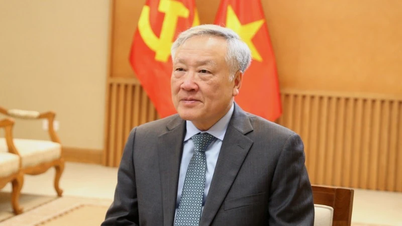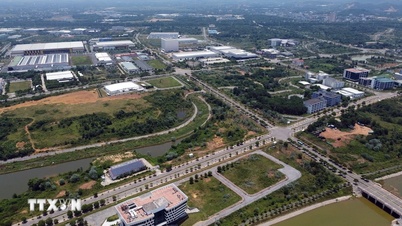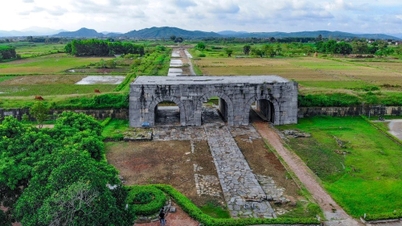From Resolution 66 and the General Secretary 's article, we can see the Party's new guiding viewpoint: The work of building and implementing laws is a "breakthrough of breakthroughs" in perfecting the institutional framework for national development in the new era; it is a central task in the process of building and perfecting the socialist rule of law state.
We must definitely abandon the mindset of banning something because we can't manage it.
Compared to the documents of the 11th, 12th, and 13th Party Congresses, Resolution 66 further emphasizes the role of building and perfecting the legal system, as previous documents only recognized it as one of three strategic breakthroughs (along with breakthroughs in infrastructure and human resources). In Resolution 66, the Politburo recognizes building and perfecting the legal system as a "breakthrough of breakthroughs," meaning it is placed at the highest priority among the priority areas.

The Politburo clearly stated: In order for the country to confidently enter a new era – an era of progress…, the work of drafting and implementing laws must be fundamentally reformed, creating a strong impetus for the rapid and sustainable development of the country. (Illustration: Hoang Ha)
Furthermore, Resolution 66 closely links lawmaking with law enforcement in an inseparable whole, both positioned as "breakthroughs within breakthroughs." To arrive at this new perspective, Resolution 66 summarized the work of lawmaking and law enforcement, pointing out "many limitations and shortcomings"; and that "the organization of law enforcement remains a weak point." From this, the Politburo clearly stated: For the country to confidently enter a new era – an era of progress… – the work of lawmaking and law enforcement must be fundamentally reformed, creating a strong impetus for the rapid and sustainable development of the country.
Starting from the perspective that lawmaking must closely adhere to reality, be grounded in the practical context of Vietnam, selectively absorb the finest values of humanity…, pave the way, unlock all resources, and make institutions and laws a competitive advantage, a solid foundation, and a powerful driving force for development; investing in policy and lawmaking is investing in development; having special and superior regimes and policies for strategic research, policy making, and lawmaking…, the Party has set forth a series of tasks and solutions.
The Party demands a decisive abandonment of the "if you can't manage it, ban it" mentality; a clear distinction between the policy-making process and the document drafting process; thorough, substantive, and scientific summaries, practical surveys, research on international experience, policy impact assessments, and policy selection; avoiding creating difficulties for citizens and businesses in policy design; building a favorable, open, transparent, safe legal environment with low compliance costs; drastically cutting and simplifying unreasonable investment and business conditions and administrative procedures; ensuring genuine freedom of business, property rights, and freedom of contract; creating a legal basis for the private sector to effectively access resources in capital, land, and high-quality human resources; and ensuring that legal regulations are stable, simple, easy to implement, and centered around citizens and businesses.
The use of phrases like "substantive," "thorough," and "decisive" demonstrates the Party's strong determination to make breakthroughs in institutions, policies, and laws to develop the country and move forward into an era of progress.
Curing the disease of fear of responsibility
Besides proposing solutions, Resolution 66 also frankly points out the current reality: the mindset in lawmaking in some areas is still heavily focused on management; the quality of laws has not kept pace with practical requirements. In particular, the Resolution clearly identifies the biggest problem with the current legal system: "There are still overlapping, contradictory, and unclear regulations that hinder implementation and are not conducive to promoting innovation, attracting, and unlocking investment resources."
Conflicts, inconsistencies, and overlaps between legal documents have been analyzed and identified by state agencies, experts, and scientists over the years. The Prime Minister has also established working groups to review legal documents. These conflicts and overlaps are the direct cause of legal procedural bottlenecks for projects, leading the National Assembly to amend three laws directly regulating land-use and real estate projects (Land Law, Housing Law, and Real Estate Business Law). The simultaneous passage of these three amended laws is considered a golden opportunity in legislation, ensuring consistency and uniformity, and fundamentally overcoming previous obstacles.
The next step was for the National Assembly and the Government to coordinate in allowing the Land Law and two related laws to take effect five months earlier to free up land resources. After the new laws were passed, there was a sense of anticipation among implementing officials and civil servants because the new laws were of higher quality, had clearer regulations, and posed less risk to them. Therefore, the earlier effective date of the new laws has somewhat addressed the "reluctance to wait" mentality of officials and civil servants (which has been referred to in the National Assembly as "fear of responsibility"), helping to save time and costs for citizens and businesses.
To cure this "fear of responsibility," the legal system must be perfected at all costs to overcome contradictions and conflicts, eliminating the phenomenon of one law being open while another is closed; and eliminating a "forest" of convoluted and overlapping documents that lead to compliance with one law but violation of another... Only then will officials "dare to act," and such courage will be worthy of praise: the courage of someone who knows what is right and decides to do what is right; not recklessness or chance.
A few years ago, a friend who was a department head at a city agency that was once a shining example of an attractive investment environment told me, half-jokingly, half-seriously: "These days, reading, understanding, and correctly applying the law is very difficult and can lead to obstacles in its implementation. To succeed, you have to apply it. To avoid making mistakes... you should temporarily refrain from doing anything."
This wasn't just a local issue regarding land management and use in the past. For example, regarding land prices, the process of valuing land for a real estate project typically took at least two years, severely impacting investors because land price is a crucial input parameter for determining business strategies. Fortunately, the 2024 Land Law promptly rectified this by stipulating a maximum land valuation time of six months.
For example, land laws stipulate four specific methods for land valuation, but local authorities are complaining because applying these methods yields vastly different results, causing concern among those who approve the prices.
Another pressing issue concerns land-use conversion. The previous Land Law contained unclear, even contradictory, regulations. On the one hand, it granted provincial People's Committees the authority to permit land-use conversion, but on the other hand, it stipulated cases requiring auctions for land use rights (for example, land allocation for commercial housing construction). So, in which cases are businesses allowed to convert land use, and in which cases must the State reclaim the land for auction or bidding?
Several of the aforementioned issues causing bottlenecks in land resources have been resolved in the 2024 Land Law. Land valuation methods and databases (likened to the production engine and raw materials) have been improved, with the expectation of delivering reliable land valuation results. Land valuation is a key point of future land policy, as prices closely reflecting market value will facilitate compensation and land clearance, reduce disputes, and prevent budget losses when land is allocated to businesses for projects.
Regarding the question of whether businesses must participate in auctions or tenders when changing the land use purpose, the new Land Law provides a specific answer to reassure officials when signing decisions.
The promulgation of Resolution 66 on reforming the work of lawmaking and enforcement, especially the solution of establishing the Central Steering Committee on perfecting institutions and laws chaired by the General Secretary, with the Prime Minister and the Chairman of the National Assembly as Vice-Chairmen, further strengthens the Party and State's determination to "make institutions and laws a competitive advantage." From a legal system that was a "maze" discouraging investors (2-3 years ago), in the coming period, the revised and perfected legal system can gradually create advantages to attract large domestic and foreign investors, transforming the private sector into the most important driving force of the economy.
Vietnamnet.vn
Source: https://vietnamnet.vn/dot-pha-the-che-cho-ky-nguyen-vuon-minh-2398355.html



































![[Photo] Prime Minister Pham Minh Chinh attends the Conference on the Implementation of Tasks for 2026 of the Industry and Trade Sector](/_next/image?url=https%3A%2F%2Fvphoto.vietnam.vn%2Fthumb%2F1200x675%2Fvietnam%2Fresource%2FIMAGE%2F2025%2F12%2F19%2F1766159500458_ndo_br_shared31-jpg.webp&w=3840&q=75)





































































Comment (0)